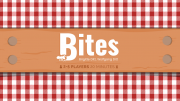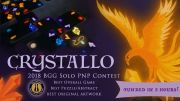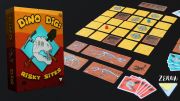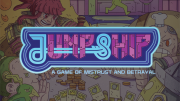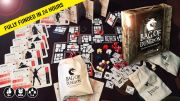Bites (Chad DeShon) – A trail of wooden tokens representing different types of foods are laid out, making a line towards the ant hill. On your turn you may move any of the five ants you wish. An ant will move to the next piece of food that is of the same color as the ant. You then choose to take the food token that is either directly in front of the ant in the line or directly behind it. When the ants reach the five leveled ant hill, they go on in the order they reached it — for example, the first ant is placed on the first level, the second ant goes onto the second level, and so forth. At the end of the game, food tokens score based on where the matching ant is on the hill (level one is worth zero points, while level five is worth four points, etc). Players can collect chocolate to activate special powers, and cards dealt at the beginning of the game can affect the rules and force you to try new strategies each game.
Casual Games on Kickstarter: Ants and Pancake Flipping Fun

From ants collecting food to pancake flipping, food takes center stage this month on Kickstarter. There’s also plenty of space involved too, from a game that puts you in charge of running your own agency during the space race, to a social deduction game in which humans must race to find the alien queen among them.
Flipflick (Kai Schmidhuber) – In this pancake-themed dexterity game, you will find yourself flipping and catching many a tasty breakfast pancake of various flavors. On your turn, you take three pancake cards and place them on the edge of the table, balancing them at the point of a line shown on the cards. Flick one card after another, using with your finger and then catching with your hand. You move up on the score track for each pancake you flip, but you can press your luck by flipping the same card multiple times in an attempt to collect extra points. Players are also attempting to collect four different pancakes or four identical pancakes in order to end the game. Players may also attempt to steal your pancakes or use action cards to help themselves or sabotage you.
Space Race (Boardcubator) – The game plays over seven rounds, with each player running their own space agency and attempting to make their agency the best. At the beginning of each round, players are dealt a new card into their hand, and then may choose to put as many cards from their hand as they wish into the unexplored universe section of the board. Later in the round these cards will move into the explored universe section, from which they can be drafted by players into their agency. Players next simultaneously play a control card from their control deck (each card can only be played once each game). Control cards allow you to take actions in your space agency and dictate which types of cards you can draft that round, as well as player order if multiple players are competing to draft the same cards. Each round represents a different decade, and players work their way from 1950 up through 2020. The agency who makes the most progress by the end wins the game.
Crystallo (Liberty Kifer) – This solo puzzle game won the 2018 BoardGameGeek Solo Print and Play contest. Six magical creatures have been trapped by a dragon in his cavern. You must release them. Each card shows crystals or an orb linked to one of the six creatures at its corners. In order to free a creature you must create a set of crystals connected to one of its orbs, and you must do this three times. Valid crystal sets are crystals that have all the same color and shape, all the same color and different shapes, all the same shape and different colors, or different colors and shapes. At the start of the game, you place one card in the center of the tale to start the dragon's cavern. When adding cards to the cavern you must place a crystal next to another crystal. Once placed, a card cannot be moved, and while you can place a card so that it overlaps part (or even all) of another card, it cannot overlap a previously completed crystal set. Once all creatures have been freed, you try to trap the dragon by creating six similar crystal sets with six different colored orbs.
Dino Dig (Zerua Games) – You set up the game by laying out a five-by-five grid of tiles, three layers deep. Each player starts the game with five tool cards. Tools give you special one-time abilities (such as moving extra spaces or peeking at tiles). On your turn you may take two actions. Available actions include moving your meeple one space, digging one tile (taking the tile your meeple is standing on, flipping it over, and adding it to your collection), or playing a tool card. Once a certain number of tile piles have been emptied in the grid, the game ends. Players score more points based on how complete a fossil is, and lose points for scorpions (unless you happen to have collected the most). The player with the most points wins the game.
Jumpship (Tau Leader Games) – In this social deduction game, players are on a space ship and each one has a special role such as captain, engineer, or first mate. You are then secretly assigned the roles of human, an alien, or the alien queen. The aliens know each other, but the humans are left in the dark. The human players are trying to fix the ship and find the alien queen before the ship reaches home. On your turn, you draw two tokens from the bag and must give them to two different players (you cannot give one to yourself). Different tokens trigger different events or actions (for example the countdown token makes time pass, the repair token allows you to work on the ship, while four scan tokens let you check if a player is human or not). On your turn you may choose to redraw your tokens once, but countdown tokens must be played immediately after being drawn, so this may cause you to run out of time more quickly.
Bag of Dungeon (Gunpowder Studios) – Bag of Dungeon is an entire mini dungeon crawler that all fits in one bag and plays in twenty to sixty minutes. Players take on the roles of heroes, moving through a dungeon looking for the ring of creation. Players choose whether to work together to retrieve the ring, but they can also betray one another and compete for a solo victory. On your turn, you roll a die to determine how many action points you have and then use these points to explore and/or use items until you run out of points. As more of the dungeon is explored, more tiles are drawn, creating different dungeon designs each time you play.
Disclosure: unless otherwise noted, we have not seen or played any of the above games. Our assessment of each is based on the information given on the crowdfunding project page.




